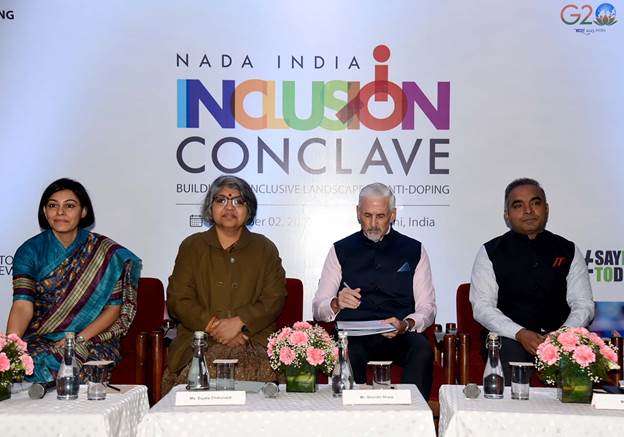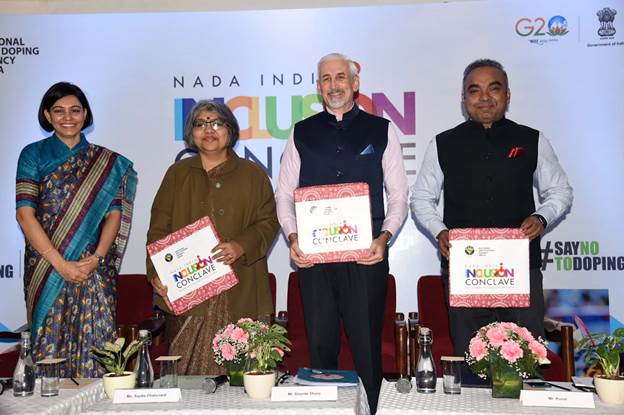New Delhi : “All aspects of the anti-doping programme are important even as India is making rapid strides towards excellence in sport. NADA would make all attempts to spread awareness towards making Indian sport, including sport for Athletes with Disabilities, dope-free.” Secretary (Sports), Ministry of Youth Affairs & Sports, Government of India Smt. Sujata Chaturvedi said this while delivering the keynote address at the Inclusion Conclave conducted by the National Anti-Doping Agency India (NADA) today in New Delhi. Inclusion Conclave was attended by participants from India and 20 countries.
Speaking on the occasion Secretary Sports Smt. Sujata Chaturvedi said that it is a good time to be in Indian sport, where under the Prime Minister Shri Narendra Modi’s leadership, initiatives like Khelo India have given sport a fillip. “We cannot ignore anti-doping while striving for excellence in sport. The National Anti-Doping Act is a step in that direction”, she said.

Mr. Shombi Sharp, United Nations Resident Coordinator, India also addressed the gathering. “The inclusion of persons with disabilities is a central promise of the 2030 Agenda for Sustainable Development – to leave no one behind,” he said. He further added “Indian athletes with disabilities have not only shown incredible grit and determination by beating all the odds – they have also brought – and continue to bring – great pride to the nation.”
NADA Director-General and CEO Ritu Sain said the Conclave was a step towards ensuring that anti doping program is inclusive and athletes with disabilities remain at core and are not left behind.
“We have to reach out to the Athletes with Disabilities keeping their needs in mind. Engaging them with content in print, audio, Braille and sign language in keeping with Universal Design of Learning (UDL) principles is a priority,” she said.
Ms Sain said NADA India is in process of sensitising 20 Dope Control Officers to specialise in collecting samples of Athletes with Disabilities in keeping with the different needs. She also said NADA would equip itself with assistive devices in Doping control process to facilitate athletes with disabilities in lines with the World Anti-Doping Code and Standards.

She said NADA India is developing Apps to spread awareness and address queries of athletes and support personnel as well as to help them recognise if any medicine they were being prescribed contains prohibited substances. “We are developing credible content that will overcome geographical, language and disability barriers,” she said.
Tokyo2020 Paralympics High Jump medal winner Sharad Kumar shared his experience of serving a two-year ban for an inadvertent anti-doping violation. He said the levels of education of Athletes with Disabilities prevented many from taking short cuts. “The anti-doping lessons are best learnt from the experience of those who tested positive,” he said.
Sharad Kumar also said that athletes who dope must realise that it leaves an impact on their bodies and minds. “Those who dope and have not tested positive cannot think they have escaped. They are guilty in their own minds and caught in their own trap,” he said, exhorting athletes not to chase popularity and rewards at the risk of their own health.
Institute of National Anti-Doping Organisations (iNADO) CEO Jorge Leyva, Asian Paralympic Committee Anti-Doping Sub-Committee Chairman Dr. Badrul Rashid, University of Birmingham’s Prof. Ian Bradley and International Inclusion and Para Sports expert Dr. Halim Jebali headline the panelists from overseas also joined an array of Indian experts.

Comments are closed.